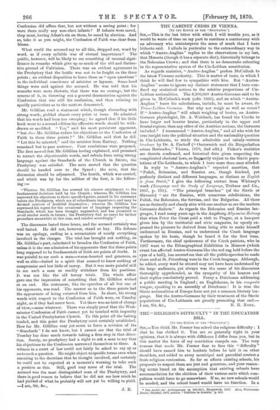THE CABINET CRISIS IN VIENNA.
[TO THE EorrOa OF THE " SPECTATOR."]
Sin,—This is the last letter with which I will trouble you, as it would be waste of time on my part to continue a controversy with an adversary who misinterprets the sense of much that I have hitherto said. I allude in particular to the extraordinary way in which "Austro-Anglian" replies to the observations iu my last, that Moravia (though it has a separate diet), historically belongs to the Bohemian Crown ; and that there is no democratic colouring in the representative system of the Cis-Leithan constitution.
As regards statistics, " Austro-Anglian " prefers McCulloch to the latest Viennese authority. This is matter of taste, in which I think he will find few to sympathize with him. But " Austro- Anglian " seems to ignore my distinct statement that I have con- fined my statistical notices to the relative proportions of Cis- Leithan nationalities. The 8,200,000 Austro-Germans said to be given in McCulloch's work (edit. 1866), and on which " Austro- Anglian " bases his calculations, include, he must be aware, the Trans-Leithan Germank. But why not weigh as well as count? If "Austro-Anglian " will admit weighing of brains, an Austro- German physiologist, Dr. A. Weisbach, has found the Czechs to have larger and heavier brains, particularly in the upper and frontal regions, than any other of the Austrian nations, the Germans included.* I recommend " Austro-Anglian," and all who wish for true insight into the political situation and the nationality question in Cis-Leithania, to study the admirable and calmly-written brochure by Dr. A. Fischoff (" Oesterreich and die Biirgschaften seines Bestandes," Vienna, 1870, 2nd edit.) Ficker's statistics are therein confirmed, and historical data given respecting the complicated electoral laws, so flageantly unjust to the Slavic popu- lations of Cis-Leithania,. to which I have more than once alluded.
In reply to " Austro-Anglian's " repeated assertion, that "Polish, Bohemian, and Russian are, though kindred, yet perfectly distinct and different languages, as distinct as English is from Dutch," I give the following extract from Whitney's work (Language and the Study of Language, Triibner and Co., 1867, p. 191). " The principal branches" (of the Slavic or Slavonic) " are the Russian, with numerous subdivisions, the Polish, the Bohemian, the Servian, and the Bulgarian. All these are as distinctly and closely akin with one another as are the modern Germanic dialects." As regards the Bohemian and Russian lan- guages, I read many years ago in the Augsburg A//genzeine Zeitung that when Peter the Great paid a visit to Prague, at a banquet given him by the territorial and civic magnates, he openly ex- pressed the pleasure he derived from being able to make himself understood in Russian, and to understand the Czech language spoken by his hosts, though he heard it for the first time. Furthermore, the chief spokesman of the Czech patriots, who in 1867 went to the Ethnographical Exhibition in Moscow (which event has affected Austro-Germans like the red rag held before the eyes of a bull), has assured me that all the public speeches he made there and at St. Petersburg were in the Czech language. Although, he added, every word he uttered may not have been understood by his large audiences, yet always was the sense of his discourses thoroughly apprehended, as the sympathy of his hearers and their replies conclusively proved. Fancy a Dutchman addressing a public meeting in England ; an Englishman, in his composite tongue, speaking to an assembly of Dutchmen ! It is true the Slavic nationalities of Europe have not yet a common literary lan- guage. But the Austro-Germans by their treatment of the Slavic populations of Cis-Leithania are greatly promoting that end.—


































 Previous page
Previous page